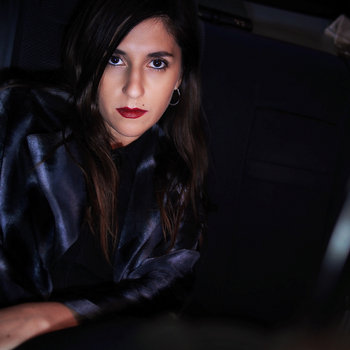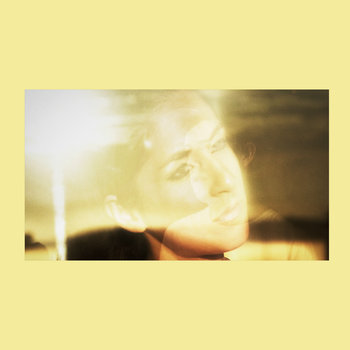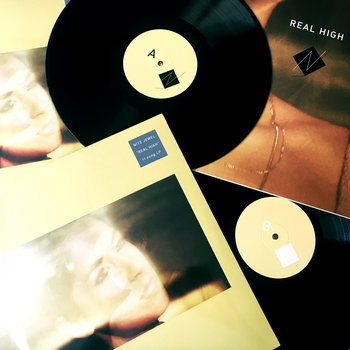
Ramona Gonzalez’s third album as Nite Jewel plays like a chilled-out tribute to ‘90s Top 40 R&B artists like Janet Jackson and Aaliyah. Gonzalez freely admits there are elements of both artists in the mix, even if their inclusion was more subconscious, but Real High is not a deliberate attempt to emulate her teenage heroes.
After consciously uncoupling with her label (the process kept her from releasing music for four years) and rediscovering the creative freedom of releasing an album on her own label Gloriette, Gonzalez found herself using music to channel frustration and sensuality in equal parts. The two ultimately end up complementing one another—from hip-shaking single “2 Good 2 Be True” to the meandering title track where Gonzalez transforms a slow-motion ballad into a meditation on the kind of love so all-encompassing there’s a temptation to throw it all away.
We talked with the Los Angeles-based musician/producer about why she opted to release her own music, holding her own in a male-driven industry, and why she’s happy to let her alter ego do the emotional heavy lifting.




Compact Disc (CD), Vinyl LP


You released Liquid Cool last year and now you’re releasing Real High. Has this been a particularly prolific period of your life?
I had this four-year period of dealing with label difficulties. During that time, you’re stifled from releasing anything to some degree. So instead of being really down in the dumps about it—well, actually I was kind of depressed about it—but nonetheless, I made enough material for three or four albums during that time. I was writing constantly. Liquid Cool was more off the cuff, but this record, Real High, is four or five years in the making.
I’m impressed that you avoided hitting a wall where it was like “screw this.” You pushed through.
I get to that wall sometimes! But I don’t ever say “fuck music.” But I sometimes say “Fuck the music industry.” It helps to do it independently. You’ll have your down days, but you’ll never feel like it’s impossible to do music if you run the business on your own to some degree. It’s really liberating. You shouldn’t worry too much about the business side. I feel like for a lot of musicians it becomes their main focus—thinking about what label they’re on. But at the end of the day, the lifespan of an artist’s career is mostly very short. If you spend a lot of time thinking about business, you haven’t made work. You have to focus on making work, and not focus so much on who is going to put it out. It’s better to not think about it, for as long as you possibly can. It’s not going to help your creative process.



Compact Disc (CD), Vinyl LP


So much of this album hinges on vulnerability. Are you generally comfortable with wearing your emotions on your sleeve?
Oh, absolutely not. I’m such a tough guy. You would never know that anything is wrong with me. On this record, it was very intentional to be more open and vulnerable with my feelings. A lot of my music comes from being guarded and taking the piss out of the listener. With this record, there’s certainly little moments of that, but it was more vulnerable. I think it had to do with going through difficulties while writing these songs, businesswise and personally. I allowed that to be part of the songs.
After this exercise, do you feel like you can be more open with people?
No, I’m failing at that. I go to therapy and we’re working on it. It exists on this album as an artist. But it hasn’t yet trickled into my own life, to the chagrin of my loved ones. But the thing about it is, to some degree, this record is this character. It’s Nite Jewel. It’s not completely me. There are parts of it that are very me, as far as subject matter and certain moments. To some degree, I’m creating a weird fantasy world where there is this woman singing who is more vulnerable and more sensual. She is open to talking about love and her love life. I think that’s why it’s a release for me, because I can’t do that on a daily basis as much.
It’s interesting how having a shield can really help.
It’s definitely a way to express things that you wouldn’t be able to do on your own in daily life. It’s funny. With all my early records—like the first record I made and released on my own label, Good Evening—people thought that it was so thoughtfully planned and beyond trend. But the whole thing was an outpouring of emotion that I couldn’t express in my daily life. I was so mad and sad about so many things. Every song was a different way to express that. Some people make music differently, where they’re making more commercial music, or music that’s directly related to their experiences. But I guess albums for me are always going to be about creating this character Nite Jewel who is the vulnerable side of myself who gets to say all these things.
I love the idea of your brain pouring everything out and then leaving other people to see the connections later.
I think you try to create as much of a through line as you can by pairing songs together that have a certain theme. But at the end of the day, and as an artist, you don’t really know what people are going to make of your album, and how they’re going to thematically tie it into itself. You just have to do the best you can, and hopefully someone else will tell you what it is.
I imagine it’s the same when it comes to the act of releasing an album. You can’t make yourself crazy thinking about that side of it.
Oh, you will! You’ll make yourself insane. Writing the bio for this record—it took me like three months, because it is so personal. But I’m also really not for self-exploitation. I think that is a lot what artists do to become successful, or because that’s how they feel they want to present their album. But I didn’t want to say, “This record is about me being a sad girl with a fucked-up life!” I just wanted it to be more nuanced than that, and then people can dig in there and pick apart the story. Self-exploitation, how artistic can that really be? It’s not a fantasy, it’s not something else, it’s just you.
I’ll admit I laughed a bit at the line, “Don’t tell me to smile because I’m keeping a frown.” I think every woman who listens to that will hear a man telling her to smile.
Exactly! That’s what it was drawn from. That very relatable experience, being on the street and someone telling you to smile. It’s also about being a serious woman. Being a businesswoman. Being a serious artist, and that being a problem societally. Not only do people tell me to smile on the street, there’s a general feeling of, “Ramona is very serious.” There’s nothing wrong with that! I’ll let you in when I decide it’s all right. That’s the line from the song.
Do you find that being a “serious” woman in the music industry means you have to work harder? Do people make assumptions about you based on gender?
I don’t necessarily have to work harder, but people can be turned off. I remember when I was working with a team of dudes and there was a joke about getting one side of me: the nice side or the bitchy side. Which basically meant when I was being compliant or when I was trying to say, “No, this isn’t good and we need to do something else.” But they would use it in a more pejorative term. To me, it’s hard in the sense that in some ways you’re not allowed to be serious. You’re not allowed to be professional. You’re not allowed to be hard on people. Because that’s unattractive to some degree. That’s the struggle.

Do you get album release jitters?
I definitely feel nauseous and anxious for about a month surrounding the release. It’s not so much worrying about how it’s going to be received. It’s more the constant wave of people’s perceptions falling over yourself. It’s like being in a room of 50 people and everyone’s looking at you and pointing out what you’re wearing. It’s a little insane in that way. But right now I’m totally focused on all the touring I’m doing over the summer.
Do you enjoy performing?
I do. I’m somewhat of a reluctant performer to some degree in the sense that I’m not like someone who spits out the same banter every night. But I love singing and I love performing and I love playing. It’s something I’ve loved doing as a kid so I get a lot out of it. I’m taking singing lessons right now because I’m going to be performing over the summer, and I love every moment of it. It reminds me of being a kid and taking singing lessons and having a recital and all the fun and excitement surrounding that. I used to do jazz when I was a pre-teen. It just brings me back to that time, when you were so innocent playing at a café and you were just the happiest you’ve ever been in your life. If I could, I would just continue to do jazz. It’s the intimate vibe. There’s this place in L.A. called the Biltmore Hotel, and sometimes they have live jazz and I walk in and I’m so jealous of the woman singing. I want to do that!
—Laura Studarus







